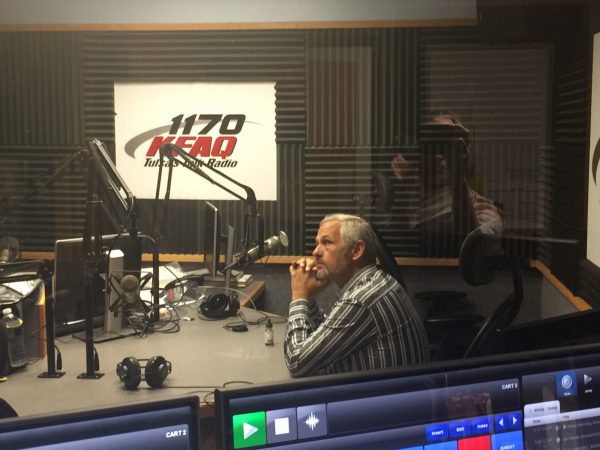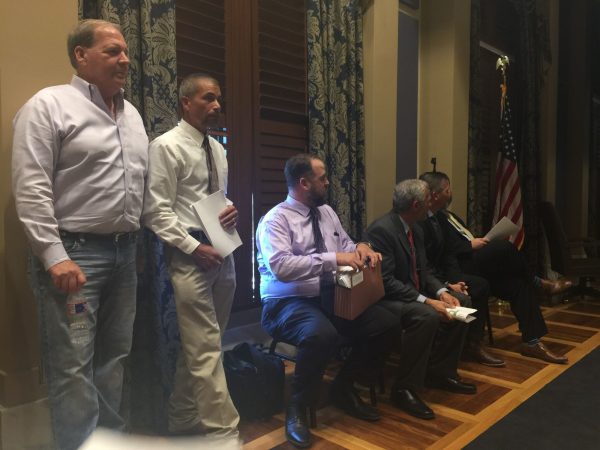Oklahoma became the 30th state to legalize medical marijuana when State Question 788 passed on June 27, 2018. The bill that made it legal to grow, sell and consume cannabis for medicinal purposes. The Oklahoma State Department of Health has been finalizing implementation of SQ788 and will begin accepting applications on August 25, 2018.
Hopegrown interviewed Chip Paul, co-founder of Oklahomans For Health and original author of SQ788 to get an update on the progress.

HG: How’s it going there in Oklahoma? Your new medical marijuana law SQ788 just passed in what many would consider a conservative state. You guys have had quite a journey.
PAUL: Wow. Yeah. It’s ultimately good -- so we're making progress — although at a micro level it doesn't seem like that.
HG: Why? What makes it not feel that way?
PAUL: Well I'll kind of give you just an synopsis of what we've been through since we passed the law. Probably a month before the election, the governor started telegraphing. She gave a variety of reasons that, if we passed SQ788, the legislature would call a special session to fix problems. But we know they wanted to basically fix the dates — meaning they intended to change the dates and potentially change some of the law. So how do we defend against that? Well, one way was to regulate under our own law. And so, along with Green the Vote — the two major cannabis organizations in Oklahoma —we came together and we produced our own set of regulations under 788 in anticipation that it would pass and it did. We presented those to the legislature on a Thursday night, two days after the election and one day before Governor Mary Fallin was set to call the session. By doing that, our regulations had to be heard by the legislature — they couldn't monkey too much with the law we passed with 57%. So the special session was canceled.
HG: That must have been a relief. So, with your own regulations, what did you have to do to start implementing them?
PAUL: What that did was then to shift us over to the OKDoH because, under our law, that's where we put regulation: at the Oklahoma State Department of Health. So we began talking to them. We began basically working kind of in a back channel way with them to red line their drafts. We couldn't start with our draft at that point, we went to their draft of regulations and began working under their draft and had red line meetings with them, which was great.

HG: And that’s when things started to get a little crazy?
PAUL: Yeah, absolutely. We had a sit down, we met specifically with Julie Ezell, the general counsel of the Oklahoma State Department of Health, and a member of her staff. We sat down and went through their drafts and expressed our concerns about their drafts and they amended their draft according to some of our concerns. There was still a bunch that wasn't amended which we protested very loudly about in emails and publicly and everything else.
HG: Can you go over some of the disparages?
PAUL: Yeah, sure. The major issues there were they had THC limits which were ridiculous. They had a $100,000 bond if you wanted to do a commercial grow — they had some just ridiculous overreach. In addition to that, at their board meeting you had board members introduce two additional amendments to the draft. And, again, this is a public board meeting. The draft had been out for public comment and you technically can't change it — that’s the very reason why we have open meeting laws.
HG: What were the two amendments?
Paul: One was no smokeable marijuana and the other was that a pharmacist must be present at all times in a dispensary. They passed that and the governor signed it the next day. After that, we found out that their general counsel [Ezell] was sending herself threatening emails, claiming to be a member of the Oklahoma cannabis community. She was discovered and she was under investigation by the OSBI. She got criminally charged and she was dismissed from her job all in the same day. The next day, text messages between her and the head of the Oklahoma Pharmacy Board came out where they were colluding to basically add this pharmacists piece. And there's probably way, way more there that will come out over time. So that's kind of where things were left at the Oklahoma state Board of Health -- just a complete train wreck mess.
HG: It must be doubly frustrating that it's not only politics that's getting involved, but criminal activity underneath politics that's throwing yet another wrench into the works.
PAUL: Oh yeah, absolutely. There's a lawsuit pending against the Department of Health board. They overreached and, in the end, that's one of the ways that we can keep them moving and committed is to sue them, which we did. We'll get to a deposition and we'll get to the bottom of the monkey business over there — who was making all these last minute changes and all that. That'll all come out. And then it'll be interesting. I think everyone will be interested. I kind of know where it will lead but we'll leave that a mystery for now
HG: Wow. How were you able to move forward after something like that?
PAUL: So shortly thereafter, within the next week, week and a half, you had the Oklahoma State Attorney General, Mike Hunter, write a letter to the Oklahoma State Department of Health saying that they were absolutely arbitrary and capricious and they had overstepped regulations in numerous ways and he asked them to fix it. When he asked them to fix it, we reengaged with them. The culmination of that reengagement was a sit down meeting with Interim Commissioner, Tom Bates, and four members of his staff. I think there was maybe 10 of us in the room and we got a three hour, line-by-line red line of their regulations. By the next day, we had produced a pretty good set — something that I, as the guy who had authored 788 or guy-who-put-it-all-together or whatever you want to call me, would've absolutely signed off on. It had testing in it. It had proper labeling and that great physician relationship. It pretty much clearly defined the commercial licenses and all of that. It was pretty well done. So now we fast forward to three days later and they come out with a new draft. It looks nothing like the draft that we've proposed. It's almost too unrestrictive. It's almost too lenient —there’s almost not enough there to be regulatory. We certainly have something that we could roll out under the Department of Health, but it needs a lot of work. Like, for instance, there's no testing regulations in there. Thankfully they at least put labeling regulations in there so that will drive some testing and I don't think any responsible person in the industry will sell something that wasn't tested or buy something and process it unless it's tested. So I think our industry will do a good job of self regulating even if we have to live with what they've done.

HG: It must be difficult to navigate a path that so few states have taken. But, at the same time, it must be exciting?
PAUL: Yes, because here’s the other thread that's working: lawmakers cannot really change SQ788 unless they go into special session or until next session. But after the first fiasco with the Department of Health, they decided to initiate a special committee — something very historic in Oklahoma. I think it's been 20+ years since this happened, but they formed a bicameral — meaning Senate and House members — bipartisan, Special Committee to look at this issue and look at regulations under SQ788. They're taking testimony from me, from Oklahomans for Health and they're taking testimony from Green the Vote which is the group that is doing SQ796/SQ797 and then also from another group called New Health Solutions run by a guy named Bud Scott. It looks like we'll be able to sit down between the three of us and kind of hammer out a regulatory framework that we will all agree on that honors the law. And we'll probably do that in the next two weeks and we'll present that to the legislature.
HG: How has it been working with the politicians and lawmakers?
PAUL: I would say that working with this legislative group, they're very curious and they're asking really good questions. It's been a very good process. I think they're learning a lot. We're teaching them a lot about the industry and, in the process of teaching them a lot about regulation and kind of what we think, they absolutely want to honor the major tenants of SQ788 — the way that we did medical conditions and how we really tightly define that doctor/patient relationship. So that is a big deal to all of us. We want to maintain that obviously the biggest deal is getting medicine in the hands of patients and making sure patients are legal and everyone agrees that no matter what happens that needs to be made available August 27th. It will be.
HG: From a lot of the press revolving around Oklahoma’s fight to legalize, it doesn’t seem typical to a lot of the stories we’ve seen from other states. Is there something you can attribute that to?
PAUL: 788 has strong, libertarian, free-market principles and so it's very important to me and everyone at OK4Health — but also the community — that this be available as a business to really any Oklahoma that wants to get into it. Absolutely everyone agrees with that and honors that. And so we have a common agreement on all of the big principles. Now if you pull back and look at this from a macro level, we have patient applications up now. We'll have business licensing available August 27th. It looks like we'll have the regulatory framework that we want as authors and proponents of the law. It doesn’t get any better than that, frankly. And it's all going really, really, really well. It's just when you go to the micro level, it's almost a daily explosion of different crap so…
HG: What would you say is the the core of what’s kept this movement going forward despite all the roadblocks?
PAUL: So many great volunteers. We were out speaking at the same events, we were working on the same projects. We absolutely unified to get this done which has been great and really cool. It's like the parties that have tried to divide [us] started off with kind of big followings and have just slowly dwindled down. It's really been the good people, good hearted people that have kind of won the day here. We were outspent one measure 10 -1, by another measure 10,000-1. We still got 57% of the vote and I think that's an amazing thing. I think that's just amazing -- that the people are that united behind this issue. So the situation that we have in Oklahoma, politically, it's very powerful right now because, again, no big interest here, no special interest. No big money. There's no agenda. I'd argue in every other state that has a medical marijuana program, there's been a big interest, there's been big money, there's been some driver to get it done. And then that driver has sat at the seat in regulation and basically mucked things up for the most part in most states. So the situation that we have in Oklahoma is wonderful in that we don't have that big driver. We’ve got some loud voices with agendas. But, definitely, we, the people, have that in check and we're going to have a really proper, really wonderful law.



